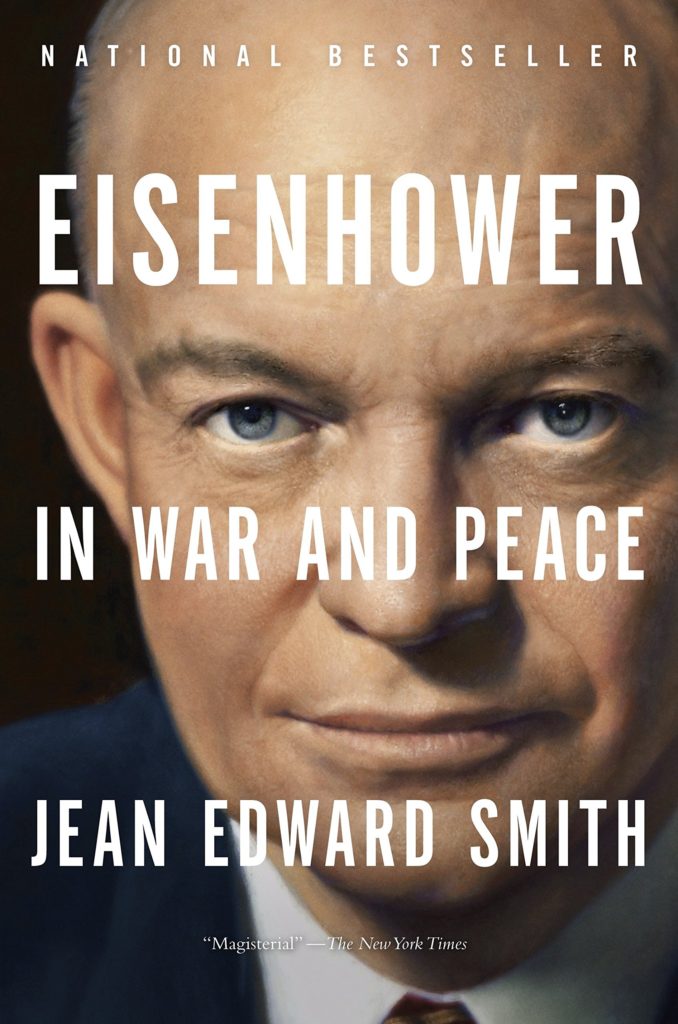I’m just folks. I come from the people, the ordinary people.
D.D.E.
Jean Edward Smith gets it done. In the acknowledgements of the two books of his I’ve read for this quest he thanks the assistants who transcribed his longhand-written legal pads into typed pages. The guy writes eight to nine hundred page books that reference hundreds of sources about global events and he does it by hand, in cursive, on legal pads. God bless you, Mr. Smith. They don’t them like you anymore.
This stage in the reading quest is somewhat of an inflection point. I’m starting to get into the presidents that were in office when my parents were kids and the collective memory around them stands in stark contrast to the ones whose stories have passed into legend. For most people, George Washington is just a face on a mountain and chapter to study in seventh grade social studies. Dwight Eisenhower was the guy who built the Interstates we still drive on today. There is something different about reading a biography of someone tangible and recent compared to one whose letters were written with a quill pen by candlelight.
Along with this shift comes a shift in reading strategy. This was the penultimate instance where I read a “big” biography of some 500+ pages (I had to know more about Nixon!) rather than the succinct offerings of the American Presidents Series. And for those of you on either side of the aisle with raised hackles that JFK and Reagan didn’t get the heavy tome treatment, relax. I’ll make my case about why when we get there.
Back to Ike. The title for this book is perfect. Eisenhower: In War and Peace conveys immediately the fact that this war hero president was in equal measure a soldier for peace. For those unfamiliar with the background of the 34th President of the United States, Dwight D. Eisenhower was the Supreme Allied Commander of the forces that stormed the beaches of Normandy on D-Day. For the two years leading up to that, he oversaw the joint effort across the European theater during WWII. He was one of only two West Point graduates to become president (shout out: U.S. Grant!). He was a solider all his life and when friends and colleagues cajoled him into channeling his fame into a run for the White House, both Democrats and Republicans lobbied hard that he be on their ticket. No one had any idea what his politics were, but everyone liked Ike.
Despite the military glory and endless laurels that were placed upon him after the war, Eisenhower dedicated much of the rest of his life to peace. Six months into his presidency he ended the Korean War and not a single American died in combat in the eight years he remained in office after the armistice. The author repeatedly highlighted Ike’s calls to peace throughout the book. To wit:
- “I hate war as only a soldier who has lived it can.”
- “It’s all so terrible, so awful, that I constantly wonder how “civilization” can stand war at all.”
- “Every gun that is made, every warship launched, every rocket fired signifies, in the final sense, a theft from those who hunger and are not fed, those who are cold and are not clothed.”
- “Our most valued, our most costly asset is our young men. Let’s don’t use them any more than we have to.”
- Didn’t agree with the use of the atomic bomb: “I disliked seeing the United States take the lead in introducing into war something as horrible and destructive as this new weapon was described to be.”
- “This conjunction of an immense military establishment and a large arms industry is new to the American experience. The total influence -economic, political, even spiritual – is felt in every city, every State house, every office of the Federal government. In the councils of government, we must guard against the acquisition of unwarranted influence, whether sought or unsought, by the military-industrial complex. The potential for the disastrous rise of misplaced power exists and will persist.”
That last quote was part of Ike’s farewell address three days before he left office in 1961. He felt, quite rightly, that he might be the singular American authority on the country’s approach to development and to defense, to peace and to war. He saw an ever-growing machine gearing up for perpetual conflicts he had spent his entire life trying to stamp out.
Dwight Eisenhower was not a great foot solider or field commander, but he was a gifted strategist and manager of people. While he read the Bible twice through before college and grew up in a religious household, he was ambiguous as to his faith most of his life and joined the Presbyterian Church only after becoming President, making him the only US President to date not to be a member of a Christian church upon election. He was a lifelong warrior who strove for peace. Finally, he was considered by contemporaries to be nearly a failed presidency, but recent polls have him near the top ten.
Which drives home my point: legacy needs time to marinate. As the time gap between leaving office and present day draws closer to zero, there is a greater risk of recency bias, hyperbole and lack of perspective. I am just as interested in the rest of the quest, but from here on there will be a large salt shaker next to my reading lamp ready to dole out grains as needed when the present-day hot takes inevitably come calling.
For my money, Dwight Eisenhower was a good but not quite great president. Like the other “war hero presidents” before him who were accustomed to strict chain of command, he found the messy tangle of politics and bureaucracy tiresome and obnoxious. He wasn’t flashy. He wasn’t particularly inspired. But he got things done; just like you’d expect a plain folks Kansas Army boy to do. Ike had his shortcomings, but he was a solid contribution to the story of the Oval Office.
Other Great Quotes
- In response to McCarthy’s crazy crusade to rid Voice of America overseas libraries of anything remotely seen as pro-Communist: “Don’t join the book burners. Don’t think you are going to conceal faults by concealing evidence that they ever existed. Don’t be afraid to go into your library and read every book, as long as that document does not offend your own sense of decency. That should be the only censorship…How will we defeat communism unless we know what it is?”
- Fought the McCarthyites again when they wanted to ban things like the endowed chair funded by the Polish government that Columbia had. Keeping this in place, Ike felt, “will make it possible for the students of Columbia to learn more about the language and literature of a country that has suffered so much. A great deal of the trouble in the world today is traceable to a lack of understanding of the culture of various countries. I intend to do all in my power to remedy this situation.”
- When shooting down the war hawks wanting to nuke Indochina: “To go in unilaterally in Indochina or other areas of the world which were endangered, amounted to an attempt to police the entire world. If we attempted such a course of action, using our armed forces and going into areas whether we were wanted or not, we would lose all our significant support in the free world.”
- So frustrated did Ike become with his own party in Congress he told his secretary, “I don’t know why anyone should be a member of the Republican Party.”
- To combat Congressional leaders that equated neutralism with Communism, “If you are waging peace, you can’t be too particular about the special attitudes that different countries take. We were a young country once, and our whole policy for the first 150 years was, we are neutral. We constantly asserted we were neutral in the wars of the world. We must not be parsimonious…As long as we are not shooting, we are not spending one-tenth as much as if we were.”
- In his diary about MacArthur: “The General is more and more indulging in a habit of damning everybody who disagrees with him over any detail, in extravagant, sometimes almost hysterical fashion.”
Trivia
- Cabinet choices were derided as “Eight Millionaires and a Plumber” after largely tapping the business sector and a labor union head.
- Appointed five Supreme Court Justices in his term, including Earl Warren as Chief.
- National Defense Education Act of 1958 – passed in the wake of Sputnik launching and gave significant federal aid to STEM and foreign languages.
- St. Lawrence Seaway – bill signed May 13, 1954
- Interstate System – The Federal-Aid Highway Act was signed on June 29, 1956 and was fully paid for by a 4 cent per gallon gas tax, which pleased everyone to not raid the Treasury and make it a usage tax.
- Got his pilot’s license at 46
- 12th 4-Star General in American History (Grant, Sherman, Sheridan, Bliss, Pershing, Marsh, Summerall, MacArthur, Craig, Marshall, Hines. Washington was 5-Star)
- Took up painting to relax.
- Member at Augusta National. Played golf for his health and played a lot. The famed Eisenhower Tree fell in 2014, which would have made him happy. He kept hitting it on his drive and lobbied for its removal in the 1950s.
- “Shangri-La”, the presidential retreat site in Maryland, was renamed Camp David in honor of Ike’s five-year-old grandson.
- Had a wartime love affair with Kay Summersby, whom he met upon first arrival in London. She was his driver.
- Smoked a shit load of cigarettes and played a LOT of poker. Became a bridge addict after he learned his junior year.
- In 1935 he worked under MacArthur in the Philippines and became a mainstay favorite of Philippine president Quezon who would often hold all-night poker and bridge games.
- Wrote A Guide to the American Battle Fields in Europe in 1927 to give tourists to Europe a guidebook about WWI battles.
- Experience walking the battlefields, meeting the French people and getting to know the terrain intimately were invaluable to his latter command of D-Day.
- Served a short postwar stint as president of Columbia University
- Served under Truman as Chief of Staff of the Army for over two years
Follow-up Reading
- Eisenhower: A Soldier’s Life by Carlo D’Este
- Ike and Dick: Portrait of a Strange Political Marriage by Jeffrey Frank
- Eisenhower: The White House Years by Jim Newton

